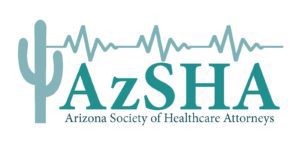ONC Information Blocking Q&A
Time: 12:00 noon to 1:00 pm
Place: Cisco WebEx
The start date for applicability of the new No Information Blocking Rule (IBR) is around the corner. Starting on April 5, 2021, health care providers and certain other actors will be expected to comply with the IBR. The IBR prohibits actors from engaging in practices that are likely to interfere with the access, exchange or use of electronic health information (EHI), unless the practice is required by law, falls into a regulatory exception or the actor lacks the requisite level of intent to violate the law. Rachel Nelson and Cassie Weaver—policy analysts and attorneys from the Office of the National Coordinator (ONC) for Health Information Technology—will be available to answer your questions about IBR compliance during our March 22, 2021, virtual AzSHA luncheon (12pm-1pm). Please send your written questions in advance to Melissa Soliz, msoliz@cblawyers.com.
Rachel Nelson, JD, MHA, currently leads a team focused on policy analysis and implementation within the Office of the National Coordinator for Health Information Technology (ONC). In 2000, she launched the federal phase of her career at the Centers for Medicare & Medicaid Services, where she led a wide variety of care quality improvement and value-based purchasing projects. Since joining ONC in 2008, she has served as senior advisor and team lead developing and implementing policy and programs to advance the capability and use of interoperable health IT to help providers deliver safe, high-value care. Rachel holds a Master of Health Administration (MHA) from Ohio University, a Juris Doctor (JD) from the Georgetown University Law Center, and an active law license in the State of Maryland.
Cassie Weaver is an attorney and policy analyst in the Regulatory and Policy Affairs Division of the Office of the National Coordinator for Health Information Technology (ONC). She specializes in all things information blocking: policy development, compliance, administration, and stakeholder outreach and education. Prior to joining ONC, she worked at the Environmental Protection Agency, and as an attorney representing indigent clients in southeast Michigan, her home state. She holds a JD from the University of Michigan of Law School and a BA in International Affairs from American University.
Due to the current social distancing recommendations, this program will be held via video conference through Cisco WebEx. This program will be $10 for members and $15 for non-members.
To register, please visit our website https://azsha.org/, click upcoming programs, on the right you will see a button that says “Register for Next Program Pay Now”. This button will take you to a screen with multiple payment options. Please select your membership level. If you are a member, please login and proceed with the payment process. If you are not a member, you will have to create a username and password to continue with the payment process.
Once you have registered online, you will receive a calendar invite containing the WebEx link. Please note, you don’t need to sign up for a WebEx Account to join a meeting.
The State Bar of Arizona does not approve or accredit CLE activities for the Mandatory Continuing Legal Education requirement. This activity may qualify for up to 1 hour of CLE credit, 0 hours of ethics, toward your annual requirement for the State Bar of Arizona.
